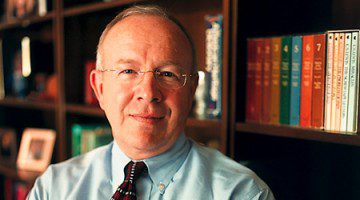By Jeff McClellan
Athletes the world over aren’t known for possessing above-average intelligence. Stories abound of the “dumb jock” who can slam dunk, hit a home run, throw a touchdown pass, and run a 4-minute mile but can’t balance a checkbook or write a coherent paragraph.
At BYU, however, athletes are bucking the trend.
At the Academic Athlete Honors Banquet sponsored by the Cougar Club in February, nearly 70 percent of BYU’s varsity athletes (those who play on an NCAA team) were recognized for receiving a 3.2 GPA or higher during at least one semester of 1996. In all, more than 300 athletes qualifed for the honor.
“I commend you for extraordinary achievement in terms of not only being first-class athletes but also in terms of being superb scholars,” said BYU President Merrill J. Bateman at the banquet. President Bateman and others said the athletes merited the honor for achieving academically while spending significant amounts of time and effort training for their sport.
“I’ve heard it likened to having a part-time job when you’re a college student,” said Greg Kite, a former BYU and NBA basketball player, “but I like to think of it more as a double major. You’re accomplishing an education and learning in an area academically as well as athletically.”
Combined with a tutoring program, a team of the year award, and an award for the athlete with the highest GPA, the academic athlete program is part of the Cougar Club’s efforts to encourage academic as well as athletic success among athletes.
“We don’t want to recognize athletes just for the athletic things that they do. We think that academics are a big, big part of anybody’s collegiate experience,” says Bob Egan, Cougar Club national president. “Really, the academics are much more important in the rest of their life, other than maybe for a few who may go on to make their millions in pro sports. But they’re so relatively few that the real value that a college education provides is in the classroom.”
Cougar Club director Dale McCann says the program has made a difference. Begun 11 years ago as an effort to encourage academic achievement and graduation among athletes, the program honored 32 percent of BYU’s athletes in its Þrst year. Since 1986, the number of athletes qualifying for the award has steadily grown. For each of the last Þve years, more than 60 percent of the athletes have qualiÞed. And he adds that the average GPA of the athletes who qualiÞed this year was 3.6.
“The program is giving athletes a better reputation and showing that student athlete is not an oxymoron,” says McCann.
Egan says the program helps show the world that at BYU academics is at least as important as athletics. “We really are focusing on the whole individual,” he says.
Other schools may encourage their athletes to study hard, says McCann, but BYU helps the students actually do it. “It’s a commitment to education, which is the motto we have: ‘More than just a game,'” he says. “It implies preparing students for life.”
The Cougar Club, which exists to raise money for and enhance the athletic programs at BYU, also sponsors a tutoring program for the athletes, who spend extensive amounts of time training and traveling for their sports. In addition, the qualifying factors for the Cougar Club’s “Team of the Year” honor include GPA, participation with the Athletics Academic Advisement Office, graduation rates, and an effective study program while the team is traveling.








